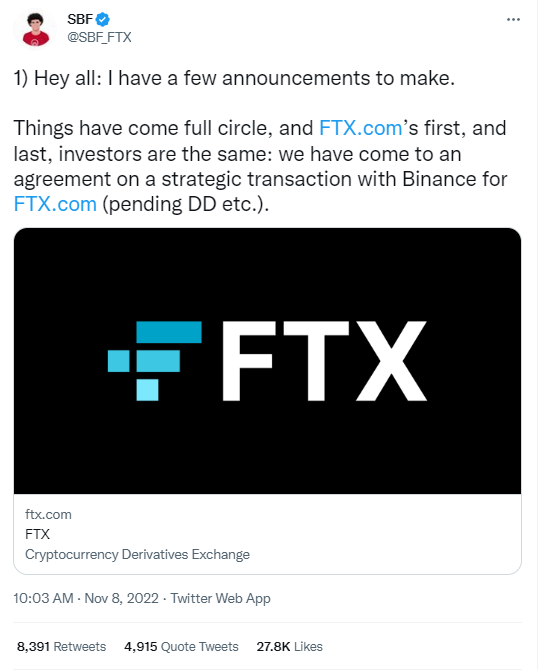News
What are the Consequences of a Potential FTX Bankruptcy?
Summary: Yesterday, it was revealed that the FTX exchange, the world’s second-biggest exchange behind Binance, was effectively insolvent and facing potential bankruptcy. This will have wide-ranging and drastic effects on the cryptocurrency market and industry and could cause a dangerous domino effect. The cryptocurrency market has been in a frenzy over the past couple of days ...
Yesterday, it was revealed that the FTX exchange, the world’s second-biggest exchange behind Binance, was effectively insolvent and facing potential bankruptcy. This will have wide-ranging and drastic effects on the cryptocurrency market and industry and could cause a dangerous domino effect.
The cryptocurrency market has been in a frenzy over the past couple of days due to the drama surrounding FTX and Binance. It all started when Binance, which held over $2 billion in FTT, the exchange token of FTX, announced it would be selling its tokens amid concerns about the financial solvency of FTX and its sister company Alameda Research. Normally, this may have only caused some panic among investors, but with the collapse of Terra, Three Arrows Capital, and Celsius earlier this year, cryptocurrency investors saw the writing on the wall, and many who had assets held on FTX began trying to immediately withdraw.

As it turns out Binance was right, as FTX did not have enough funds to cover all the withdrawals. Consequently, there was an announcement by Sam Bankman-Fried, CEO at FTX, that Binance would be acquiring the FTX exchange pending due diligence. This caused widespread relief in the crypto markets and the FTX saga appeared to be over.

Unfortunately, this was not the case. After taking a look at FTX’s balance sheets, Binance decided to not go through with the acquisition, and the markets erupted into chaos yet again. It was revealed that FTX is facing an $8 billion shortage and bankruptcy is likely. To make matters worse, it was reported that the majority of their legal and compliance team has quit, and there seems to be no hope of revival for the exchange, leading many who had funds on the platform to lose everything.

Not only is this a terrible situation for the thousands of users losing funds that they thought were safe, but it could also have long-lasting impacts on the entire cryptocurrency industry. The aforementioned sister company of FTX, Alameda, has over a billion dollars in assets like Solana, Ethereum, and other top cryptocurrencies. The possibility of mass liquidations could lead to massive price dumps for these assets. In fact, SOL is already down almost 50% in the past few days, as it was one of the ecosystems favored by FTX and Alameda. This could single-handedly kill a lot of momentum the cryptocurrency industry was getting from the rise of Layer 2s, developments in zero-knowledge technology, and Ethereum’s Merge.
The most consequential impact of FTX’s bankruptcy could come from the effect it will have on regulations in the space. The SEC and other government bodies have been looking very closely at the cryptocurrency industry recently, and the regulation of the market seems like a top priority of this decade, especially with former MIT blockchain professor Gary Gensler heading the SEC. The collapse of Terra and the UST stablecoin already made regulators wary of stablecoins, and it is anticipated that stablecoin regulation will come out relatively soon. With the collapse of one of the biggest and most well-known exchanges, there is even more reason to enforce strict regulations over the industry. While these will arguably be helpful, as they will prevent another FTX-esque event from happening, there is no guarantee that they will be perfect and they could stifle innovation in this nascent industry.

The only winners in this situation seem to be Coinbase and Binance, two exchanges that claim to not do anything with users’ funds other than custody them. This along with the fact that FTX US is a separate entity and was somewhat saved from the issues with FTX may make regulators think they have the green light to impose even stricter regulations in the name of consumer protection. Hopefully, they realize that this issue was caused entirely by a centralized company and that the DeFi space had nothing to do with this disaster.
Obviously, the FTX situation is a net negative for the cryptocurrency market, and there is very little that can be said or done to remedy the situation. Unfortunately, these are the growing pains associated with a speculative and unregulated market, and lessons have to be learned along the way. Even though this is a large setback, it does not mean that cryptocurrencies are dead or that the vision for Web3 is over. Instead, it emphasizes the importance of having control over one’s assets, demanding more transparency from centralized entities in the space, and calling for regulations that protect individuals while continuing to incentivize innovation and growth of blockchain technology.
By Lincoln Murr
Tags: Alameda Research,Binance,Coinbase,FTX
Link: What are the Consequences of a Potential FTX Bankruptcy? [Copy]